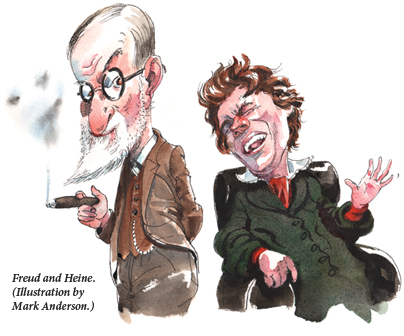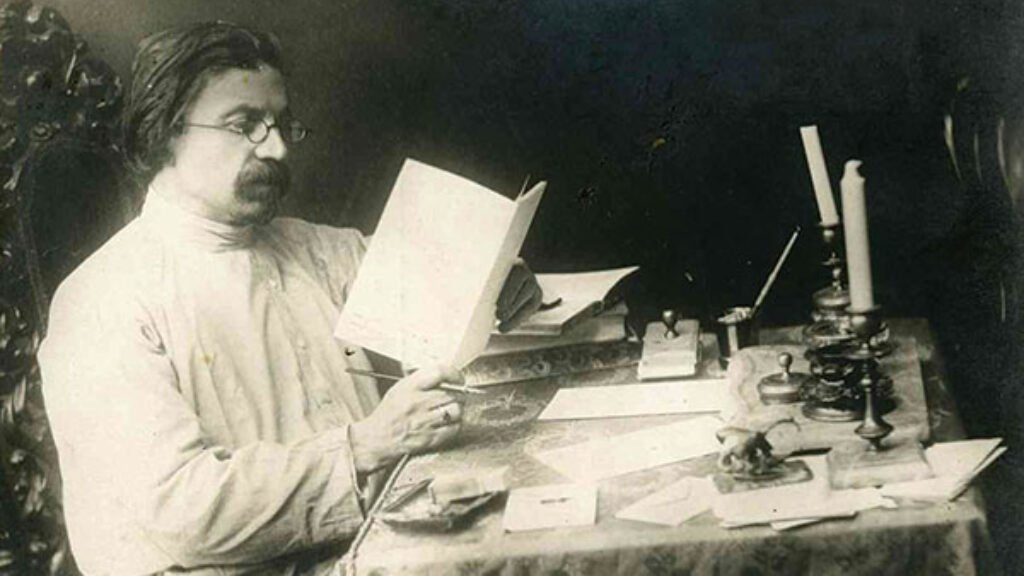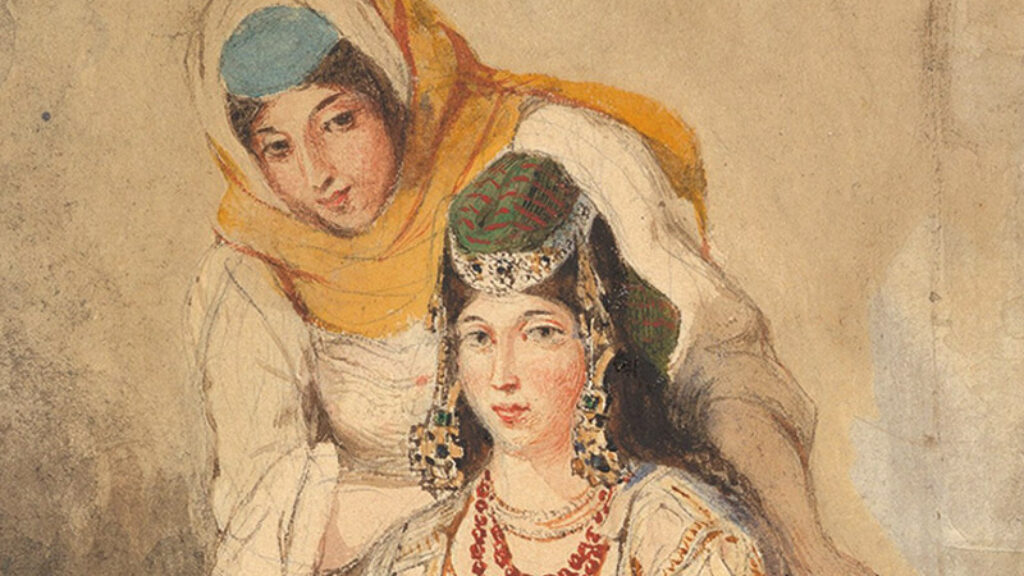No Joke
Sigmund Freud, the founder of psychoanalysis, loved Jewish jokes and for many years collected material for the study that would appear in 1905 as Jokes and Their Relation to the Unconscious. He appreciated one-liners: “A wife is like an umbrella; sooner or later one takes a cab.” He was fond of wordplay: old people fall into “anecdotage”; the Christmas season kicks off the “alcoholidays.” He especially favored Jewish jokes in which matchmakers, rabbis, and sophisticated beggars, or schnorrers, upend our expectations of them:
The young man was most disagreeably surprised when the proposed bride was introduced to him, and drew aside the shadkhen—the marriage broker—to whisper his objections: “Why have you brought me here?” he asked reproachfully. “She’s ugly and old, she squints, and has bad teeth … ” “You needn’t lower your voice,” interrupted the broker, “she’s deaf as well.”
Two Jews meet in a railway carriage at a station in Galicia. “Where are you going?” asks one. “To Cracow,” replied the other. “What a liar you are!” objects the first. “If you say you’re going to Cracow, you want me to believe you’re going to Lemberg. But I know that in fact you’re going to Cracow. So why are you lying to me?”
A schnorrer, who was allowed as a guest into the same house every Sabbath, appeared one day in the company of an unknown young man who was about to sit down at the table. “Who is this?” asked the householder. “He’s my new son-in-law,” the schnorrer replied. “I’ve promised him his board for the first year.”

In the first joke, expecting the shadkhen to parry the young man’s objections, we are surprised that he reinforces them instead. In the second, convolution, which normally serves to obscure the truth, ends up confirming it. In the third, the beggar assumes the host’s prerogative, manifesting largesse at the expense of his benefactor. Reversal, displacement, and turning the tables are the wellsprings of a tradition that mocks the contradictions of Jewish experience—the gap between accommodation to foreign powers and promise of divine election. Although many religions acknowledge a tension between the tenets and confutations of their faith, few have had to balance such high national hopes against such a poor political record. Jewish humor at its best interprets the incongruities of the Jewish condition.
Although Freud draws heavily on the humor of his native Jewish culture, he extrapolates from it only such findings as are presumably universal. He is interested in the relation of joking to other psychological phenomena, not in relation to Jews. “[We] do not insist upon a patent of nobility from our examples,” he writes. “We make no inquiries about their origin but only about their efficiency—whether they are capable of making us laugh and whether they deserve our theoretical interest. And both these two requirements are best fulfilled precisely by Jewish jokes.” One can’t help musing on the analyst’s reluctance to comment on the Jewishness of the Jewish material he discusses. Take a phrase like “patent of nobility”—transposed from the Yiddish yikhes-briv, a hybrid Hebrew-Yiddish term for pedigree. The irony implicit in Freud’s use of the term derives from the distinction between Jewish and Christian-European concepts of nobility, with each side looking down on the standards of the other.
Freud’s obvious pride in the claim of Jews to primogeniture as well as cultural and ethical advantages over their Christian overlords belies the scientist’s claim to be transcending parochialism.
Only once in this book does Freud indulge in some speculation about the specifically Jewish affinity for humor. He does so during a discussion of tendentious jokes, “when the intended rebellious criticism is directed against the subject himself, or, to put it more cautiously, against someone in whom the subject has a share—a collective person, that is (the subject’s own nation, for instance).” In other words, Freud makes a distinction between jokes directed by Jews at Jews and jokes directed at Jews by foreigners—not because the former are any kinder, but instead because Jews know the connection between their own faults and virtues. “Incidentally,” he concludes this part of the exploration, “I do not know whether there are many other instances of a people making fun to such a degree of its own character.” The offhand quality of this observation has not prevented it from becoming the most quoted sentence in Freud’s book, perhaps because others have realized better than the author how much it says about the Jewish condition.
Freud put up with anti-Semitism in much the same way that he accepted civilization with its discontents. He therefore welcomed joking as a compensatory pleasure—the expressive venting of people who lived under the double weight of their own disciplining heritage and the collective responsibility to behave well among the nations.
A writer Freud cherished as both a poet and a wit was Heinrich Heine (1797-1856). Coming of age at a moment when Jews were being admitted to German society, Heine knew he had something fresh to introduce into the high culture of Goethe and Schiller—a literature less focused than theirs on achieving comprehensive truth and classical perfection, and thus truer to volatile reality. No Jewish writer ever took more aggressive risks.
Born in Düsseldorf, then under French rule, Heine published his first book of poems in 1821. Though he studied law and philosophy, he was a natural poet, pushing the form to the limits of lyrical, political, and critical expression. His writing drew on warring elements in his nature: romantic longing versus analytic skepticism, socialist sympathies tempered by monarchist preferences, and a love of the German language and homeland that endured a quarter century’s residence in France. In his lyrics, Heine proved that he could “do” perfection; more than seventy-five composers, including Schubert, Mendelssohn, Schumann, Liszt, and Wagner, set his poems to music. Sharing a widespread contemporary attraction to folk poetry, Heine achieved some of its effects of “artlessness” in his art.
But he was just as keen to register imperfections—in politics, human nature, and himself. Heine’s best biographer, Jeffrey L. Sammons, advises extreme caution in describing both who Heine was and who Heine thought he was, and the avalanche of arguments over his legacy renders foolish any attempt to provide a definitive characterization of the man and his career.
Heine’s conversion to Christianity, for example—an act that was fairly common among his Jewish contemporaries—acquired notoriety only because he cast himself as at once a renegade Jew and phony Christian. He called his conversion an Entréebillet zur europäischen Kultur—a jibe that had many teeth. By using the French term for “ticket of admission,” he implied that the German language had to pay its own ticket of admission into European culture, just as the Jew paid through baptism for his. In addition, the commercial terminology mocks both conversion as a religious experience and the person who submits to it, not to mention others as well. Christians are ridiculed for accepting inauthentic converts, Jews for trading their culture for one that despises their own, and enlightened Europeans for exposing the bias at the heart of their liberal affectations by requiring the credential of Christian baptism that they otherwise pretended to spurn. In a single breath, Heine thus damns all parties to the dishonest bargain and himself most of all, since he knew that the teaching post he hoped to gain by his conversion had not come through.
When I studied 18th– and 19th-century European literature in college, Heine’s lyric “Ein Fichtenbaum steht einsam” (translated here by Emma Lazarus) was presented as the epitome of Romantic longing. It depicts a pine tree standing lonely on a northern height, slumbering under its cover of snow and ice, and dreaming of a palm tree in the East, that mourns lonely and silent on a blazing cliff.
There stands a lonely pine-tree
In the north, on a barren height;
He sleeps while the ice and snow flakes
Swathe him in folds of white.
He dreameth of a palm-tree
Far in the sunrise-land,
Lonely and silent longing
On her burning bank of sand.
Male pine and female palm, each solitary, majestic, and destined to yearn for what can never be joined, are coupled in the harmonious medium of a lied—German for both poem and song—that forges their conciliation across the gap between the two stanzas. The accord of the words supplants the rupture of feeling.
This is the kind of poetry at which Heine excelled, but it was not the only kind. Another way of expressing the same Zerrissenheit—the condition of being torn apart—was through wit. This, too, yokes opposites, although instead of harmonizing the disjunction, wit accentuates it with a verbal surprise. Although by no means the only practitioner of the aggressive wit that came to be known as Judenwitz (a form also practiced by non-Jews), he became its master.
If I were teaching European Romanticism today, I might tweak the syllabus to include, alongside “Ein Fichtenbaum,” one of Heine’s comic takes on the Romantic poet (that is, himself). “The Baths of Lucca,” one of his four so-called travel pictures, has the added advantage of being a send-up of Jews. The parody begins with his choice of genre. Modeling himself on then-popular accounts of which the best known was Goethe’s Travels in Italy, Heine confesses that “there’s nothing more boring on this earth than to have to read the description of an Italian journey—except maybe to have to write one—and the writer can only make it halfway bearable by speaking as little as possible of Italy itself.” Accordingly, the Tuscan resort town of Lucca serves Heine merely as the setting for an encounter among displaced German Jews who have come to take the baths.
The narrator, “Dr. Heine,” drops in on Lady Matilda, whom he had previously known in London. In doing so, he recognizes a second visitor as the converted Jewish Hamburg banker Christian Gumpel, now the Marquis Christoforo di Gumpelino, who pronounces himself madly in love with Matilda’s countrywoman, Lady Julie Maxfield. To while away the time, the two prospective suitors set out to visit Gumpelino’s local Italian lady friends. Huffing and puffing through the picturesque hills of Lucca, they encounter Gumpel’s valet, whom the author recognizes as Old Hirsch, his former Hamburg lottery agent. While the author and Gumpelino pay an extended visit to the Italian courtesans, the servant is dispatched to arrange an evening rendezvous for his master with Lady Maxfield. The erotic adventure subsequently falls through, and the work concludes with an improbable discussion of poetry in which merciless fun is made of August von Platen (1796-1835), a real-life fellow poet of Heine’s. The ridicule ended up damaging Heine’s reputation more than it did von Platen’s.
In the sunny opening chapters of “The Baths of Lucca,” however, the main target of ridicule is Gumpelino, the Jewish convert to Catholicism and newly minted marquis. Matilda reveals her prejudice against this man when she tells Dr. Heine not to be put off by his nose, which for the latter then becomes the focus of an extended comic riff, or shpritz, following Peter Wortsman’s translation:
Matilda’s warning not to knock against the nose of the man was sufficiently well-founded, a little more length and he’d have surely poked my eye out with it. I don’t want to say anything bad about that nose; quite the contrary, it was of the noblest form, and in a sense it’s what gave my friend the right to add a Marquis’ title to his name. For one could tell from his nose that he came from noble stock, that he descended from an ancient international family with which even our Lord God established nuptial ties without fear of rendering Himself déclassé. This family has indeed come down in the world a notch or two since then, so that, ever since Charlemagne’s day, most are compelled to earn their living by peddling old trousers and Hamburg lottery tickets, albeit without in the least letting up on their pride of ancestry or ever abandoning hope of recuperating their old holdings, or at least receiving adequate compensation for emigration, if ever their old legitimate Sovereign fulfills his promise of restoration, a promise by which He’s already led them around by the nose for two thousand years. Did their noses perhaps grow so long from being so long led around by the nose? Or are these long noses a kind of uniform whereby Jehovah, the King of Kings, might recognize His old yeomen of the guard even if they deserted the ranks? The Marquis Gumpelino was just such a deserter, but he still wore his uniform, and it was ever so brilliant, adorned with little crosses and stars and rubies, a red coat of arms in miniature and plenty of other decorations, too.
Ah, that nose. Where Matilda mocks Gumpel’s protuberance, the narrator, speaking as a proper Protestant and without betraying his Jewish origins, beats her at her own game by mocking the bloodline that, as a Christian, she shares. Religion is treated as a social commodity. Judaism gets the brunt of the ridicule, but the credulous Jewish tribe comes off more appealingly than does the Jew who believes he is trading up by discarding it. Like Freud, Heine draws attention to the “noble stock”—ancient and related to God—that he simultaneously puts down, with the nose as the ambiguous marker of both superiority and slavish servitude. Underlying this ambiguity is the reality of Europe, some of whose autocrats were intent on preventing the “progress” of their restive subjects. In such changeable times, did Jews prove their mettle by staying Jewish or by leaving their Jewishness behind?
The dramatic construction of this work assigns to Matilda the meaner prejudice and to the Heine stand-in a loftier skepticism—one that also distinguishes him from Gumpelino’s wholehearted devotion to his new religion and position. Both men are converts, but Gumpelino is sincere—in his adopted Catholicism, acquired romanticism, and passion for a married woman. An all—purpose worshipper, an enthusiast of nature, he declares Heine a torn man, a torn soul, “a Byron, so to speak.” But the Byronic author revels in the discordances of his life. “Whosoever claims that his heart is still whole merely acknowledges that he has a prosaic . . . heart.” Once upon a time the world was whole, but since then the world itself has been ripped in two. “[The] wretched worldwide tear of our time runs right through my heart, and for that very reason I know that the great gods have shown mercy and deemed me worthy of a poet’s martyrdom.” The divided being personifies the spirit of the times, and none more so than the Jew, living in one place while belonging to another, claiming election and experiencing subjection, and in Heine’s case, raised in one religious tradition and acculturating to another without wholly letting go of the first.
It is worth recalling that Heine’s near-contemporary Nachman of Bratslav (1772-1810) is credited with having said Es iz nito keyn gantsere zakh vi a tsebrokhn harts, “there is nothing as whole as a broken heart.” For their part, Nachman and Heine accept fracture—the former in metaphysical and the latter in earthly terms. Yearning is Nachman’s expression of faith in the ultimate, messianic reunion beyond the world as we know it. Heine treats his yearning as a comic relic, as if the human were longing for his absent tail.
Another comically bifurcated modern is Gumpelino’s valet, Old Hirsch, the third Jew of “The Baths of Lucca,” who never converts to Catholicism like Gumpelino or to Protestantism like Heine, but instead accepts the position of servant as the price of remaining the Jew he is. As Hirsch approaches from the distance, the narrator tells us,
I recognized someone whom I’d have sooner expected to meet on Mount Sinai than on the Apennines, and that was none other than Old Hirsch, sometime resident in Hamburg, a man who had not only made his mark as an incorruptible lottery collector but who was likewise so knowledgeable about foot-corns and jewels that he could not only distinguish between the two but also skillfully excise the former and precisely appraise the latter.
On drawing closer, Hirsch hopes that the author will still recognize him even though his name is now . . . Hyazinth. Gumpelino is outraged at the servant’s revelation of their common past, but Hirsch-Hyazinth compulsively blurts out what his master has tried to conceal. The entire passage is a palimpsest of the newly minted European superimposed on the ghetto Jew—a figure who has adapted to his new condition and name without shedding his old skin. Heine, who elsewhere pits Hebraism against Hellenism, here forges a character in whom Jew and Greek are improbably combined. No wonder this man should be a connoisseur at once of bunions and gems, the irritants and adornments of living. Hyazinth later boasts about the money he has saved by retaining his initial when he changed his name-a little joke at the expense of the author, who had exchanged Harry for Heinrich, but who turned out to be both less competent and less well-adjusted.
He is also not as funny. Though Heine declares himself the master poet of Zerrissenheit, he assigns Hirsch-Hyazinth the wittiest wordplays. The servant describes his master Gumpelino kneeling in adoration every evening for a full two hours before the “primadonna with the Christ child”—a painting that cost him six hundred silver coins. He also yearns for “Hamburg with its apes and excellent humans and Papagoyim.” Papageien, German for parrots, are here punned into a species of humans who mimic Gentiles. And then there is the one that was analyzed to death by Freud: “I sat next to Salomon Rothschild, and he treated me as his equal, altogether famillionairely.” Freud mined Jewish joking for what it could tell him about the workings of the human psyche. But Heine, his primary source, paid closer attention to the conditions that generated the humor: his comedy was fully alive to the dangers that produced it.
Suggested Reading

Moshkeleh the Thief
“The holiday is also sweet and dear because poor and dejected Jews toil hard, alas, and struggle, and just barely, in the nick of time, amid great trouble, angst and tribulations, bring in the holy holiday. Now, finally, they can rest and relax for eight days in a row.” A new translation of Sholem Aleichem by Curt Leviant.

Tools of Hope: Finding Guidance from Rabbi Ovadiah Yosef
The Jewish muscle-memory that shapes our collective intuition, guides our response to calamity, and gives us hope that we will overcome this, too.

Memories of Morocco
In the 1940s Moroccan Jews were still sacrificing a bull on the Sultan’s doorstep. There was a deep cultural symbiosis of Jews and Muslims in North Africa.
The Jewbird
It is in his stories, rather than his novels, that Malamud emerged as a unique writer. A new series brings new exposure to both.
Comments
You must log in to comment Log In